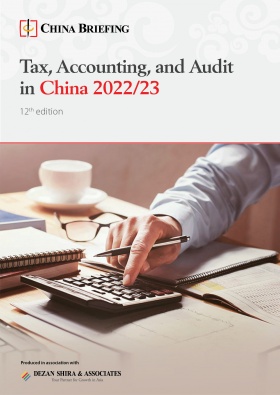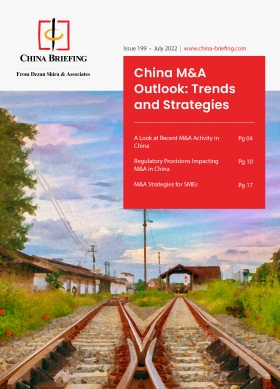China Extends Raft of Preferential Tax Policies and Fee Cuts
Further extensions to several of China’s preferential tax policies aim to provide continued support for small and low-profit companies and key industries in the era of post-COVID economic recovery. The extended policies include pre-tax deductions on R&D expenses, reduced corporate tax rates for low-profit companies, and reductions to insurance premiums, among others. We explain which policies have been extended and who can continue to enjoy them in 2023 and beyond.
At an executive State Council meeting chaired by Premier Li Qiang on March 24, 2023, China’s State Council announced the renewal of a range of supportive tax and fee policies. Some of these policies, which include cuts to certain taxes and fees for small enterprises, were instituted to incentivize certain industries, while others were implemented during the COVID-19 pandemic in order to support various types of entities that were vulnerable to pandemic-related disruptions.
According to the meeting readout, the extended policies are expected to reduce the annual tax and fee burden on eligible companies by more than RMB 480 billion (approx. US$69.8 billion).
Below we provide an overview of all of the tax and fee policies that have been renewed.
Which of China’s preferential tax policies have been renewed?
Tax deduction for R&D expenses
The policy of increasing the pre-tax deduction ratio of R&D expenses for certain eligible companies from 75 percent to 100 percent will be continued for the long term, with no expiration date specified.
This policy was previously only available to manufacturing enterprises. Technology-based small- and medium-sized enterprises (TSMEs) were only eligible for 75 percent pre-tax deductions (starting from January 1, 2021). The 2022 Government Work Report, released on March 5, 2022 during the annual Two Sessions meetings, expanded the policy to TSMEs as a means of encouraging innovation.
Then on September 28, 2022, the Ministry of Finance (MOF), State Taxation Administration (STA), and the Ministry of Science and Technology (MOST) temporarily expanded the policy of the super deduction of R&D expenses to general enterprises. According to the joint announcement, the ratio for the additional pre-tax deduction for R&D expenses for enterprises that were already eligible was raised from 75 percent to 100 percent during the period from October 1, 2022 to December 31, 2022.
The State Council readout stated that the temporary expansion would now be extended and improved to become a long-term policy, which demonstrates the Chinese government’s eagerness to support tech innovation.
For information, see our article on tax incentives in China to encourage technology innovation.
Reduced income tax for small low-profit enterprises and sole proprietors
The policy of reducing the income tax of small low-profit enterprises (SLEPs) and sole proprietors with an annual taxable income of less than RMB 1 million (approx. US$145,469) has been extended and adjusted until the end of 2024. These incentives initially expired at the end of 2022.
According to a notice from the MOF and STA released on March 26, 2023, the policy will be implemented as follows:
- SLPEs whose annual taxable income does not exceed RMB 1 million, are eligible to be taxed on just 25 percent of their taxable income and for a reduced corporate income tax (CIT) rate of 20 percent; and
- Sole proprietorships with an annual taxable income of below RMB 1 million will have their individual income tax (IIT) reduced by half.
SLPEs refer to companies that operate in non-restricted areas and industries with an annual taxable income of less than RMB 3 million (US$436,408), less than 300 employees, and total assets of less than RMB 50 million (approx. US$7.3 million).
Previously, SLPEs were subject to a 20 percent CIT rate on 12.5 percent of the taxable income amount for the portion of taxable income not exceeding RMB 1 million, during the period from January 1, 2021 to December 31, 2022.
That is to say, after the extension and adjustment, the effective CIT rate for SLPEs’ annual taxable income below RMB 1 million increases from 2.5 percent to 5 percent, which is in line with that for the portion of SLPEs’ annual taxable income that is more than RMB 1 million but less than RMB 3 million.
| Corporate Income Tax Cuts for Small and Low-Profit Enterprises (SLPEs) | ||||
| Annual taxable income (ATI) | Tax base | CIT rate | Effective CIT rate | Effective period |
| The portion below RMB 1 million | ATI*25%
|
20% | 5%
|
January 1, 2023 to December 31, 2024 |
| The portion between RMB 1 million and RMB 3 million | January 1, 2022 to December 31, 2024 | |||
For more information, see our full article on China’s tax incentives for small businesses.
Reduced unemployment and work-related injury insurance premium rates
The policy of reducing unemployment and work-related injury insurance premium rates will be extended until the end of 2024. This policy has already been extended multiple times but was set to expire on April 30, 2023.
For the duration of the last extension (May 1, 2022 to April 30, 2023), the total unemployment insurance premium rate (employer and employee) was reduced to 1 percent. Meanwhile, local rates for individuals and companies can be set by the individual province, region, or municipality, but the rate must be the same within the region and the individual rate cannot be higher than the company rate.
Meanwhile, for work-related injury insurance, in areas where the cumulative balance of the work-related injury insurance fund can cover 18 to 23 months of payments, the current rate was reduced by 20 percent. In areas where the cumulative balance of the fund can cover more than 24 months of payments, the current rate was reduced by 50 percent.
However, the STA and MOF have yet to set the rates for the next period, which would start on May 1, 2023.
Zero tax rate on coal imports
The policy to impose a zero-tax rate on coal imports will be extended for the period from April 1, 2023 to the end of 2023, per an announcement from the Customs Tariff Commission of the State Council. This is to help “support the safe and stable supply of domestic coal”. This policy was first announced in April 2022, possibly in response to power crunches experienced as a result of an effort to reduce carbon-heavy projects the previous year.
The extension suggests that maintaining energy security is still high on the government’s agenda, despite simultaneous efforts to reduce carbon emissions.
Reduction in urban land use tax policy for storage and logistics
The policy of reducing the urban land use tax on land used for bulk commodity storage used by logistics companies by 50 percent will be extended to the end of 2027.
This policy was introduced by the Ministry of Finance and State Tax Administration in March 2020 to promote the development of the logistics industry and was initially set to expire at the end of 2022.
The “logistics enterprises” refer to businesses involved in warehousing or transportation and third-party logistics services (such as warehousing and distribution for industrial and agricultural production, circulation, import and export, and so on), among others. The commodity storage facility on the land must also meet certain requirements and be used to store certain types of bulk commodities and must be directly used for this purpose.
Reduction of employment security fund for the disabled
The policy to reduce the payment of employment security funds for disabled people has been extended until the end of 2027 to reduce the burden on small and micro enterprises. This policy was initially implemented in 2020 and expired at the end of 2022. The extension has been retroactively implemented from January 1, 2023, and eligible companies that have already paid relevant funds can apply for a refund.
The specific policy is as follows:
- If an employer arranges for the employment of disabled persons at a rate equal to or greater than 1 percent, but less than the proportion stipulated by the local provincial, autonomous region, or municipal government, they can pay 50 percent of the prescribed fee to the disability employment security fund.
- If the employer arranges for the employment of disabled persons at a rate below 1 percent, they shall pay 90 percent of the prescribed fee to the disability employment security fund.
In addition, companies with 30 employees or fewer will continue to be exempted from the employment security fund for disabled persons.
Impact of the extensions on China’s preferential tax policies
The extensions of China’s preferential tax policies that have been implemented so far are considerably smaller than those implemented in 2022 when the government was keen to prop up businesses that were struggling under the COVID-19 pandemic. In 2022, the government implemented around RMB 4.2 trillion (approx. US$611 billion) worth of preferential tax and fee policies for various industries and companies.
The smaller scale of preferential tax and fee policies in 2023 is perhaps natural given the full reopening of China’s economy and border after the COVID-19 pandemic. This means that there is a less immediate need to prop up vulnerable companies and industries. At the same time, the continuation of large-scale tax and fee cuts is not viable in the long term, especially given the strained budgets of local governments.
However, with recovery being on the top of the government’s agenda in 2023, it still wants to provide impetus and support for certain areas of the economy and therefore will continue to provide support where possible.
About Us
China Briefing is written and produced by Dezan Shira & Associates. The practice assists foreign investors into China and has done so since 1992 through offices in Beijing, Tianjin, Dalian, Qingdao, Shanghai, Hangzhou, Ningbo, Suzhou, Guangzhou, Dongguan, Zhongshan, Shenzhen, and Hong Kong. Please contact the firm for assistance in China at china@dezshira.com.
Dezan Shira & Associates has offices in Vietnam, Indonesia, Singapore, United States, Germany, Italy, India, and Russia, in addition to our trade research facilities along the Belt & Road Initiative. We also have partner firms assisting foreign investors in The Philippines, Malaysia, Thailand, Bangladesh.
- Previous Article Investing in China’s Healthcare Sector – New Issue of China Briefing Magazine
- Next Article China’s 2023 Government Work Report: Highlights from the Two Sessions








